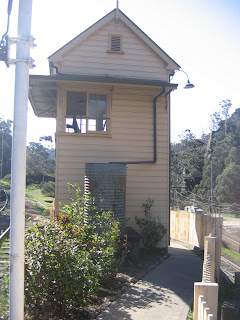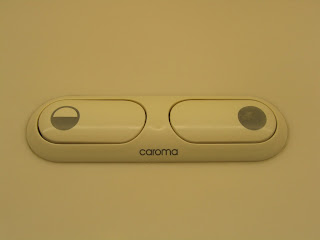Lately I’ve noticed an increase in information about “green living”. There are government messages on TV, newsletters coming in the mail, seminars at work, and I’ve stumbled upon a few
blogs with “green” living ideas. I have co-workers that bicycle to work, have their laundry water redirected out to their lawn and gardens (they use earth-friendly cleaners in the laundry), and have "save a tree - think before printing" messages attached to their emails. All of this exposure to conservation ideas has made us think about changes we can make.
We have done a few things here, but more for our own convenience than because we are thinking of the environment. For example, we are basically car-free, but that is because we’re in Australia for such a short time. We purchased reusable grocery bags because the plastic bags just don’t hold up for the walk home from the store and the reusable bags hold more, so the number of bags we carry is less. A dual flush toilet came with the apartment, so we conserve toilet water by default.
The dual-flush is the first "green" thing we experienced in Australia that we thought of doing at home. It’s such a simple way to conserve water. Once it’s installed, there is nothing to do but use it. No effort, no change in lifestyle, and yet it’s a positive change. Some other big changes we are thinking of making are installing a rainwater collection tank to use for our lawn and installing solar panels for energy. I’m also thinking about riding a bike to work when the weather allows. My office is close enough and I can shower at the gym across the street from work. The big problem for me is getting to work on time. It would require a major change in my habits to leave the house in time to ride to work, shower at the gym and make it to the office on time. I’m attached to my sleep, so this is something I really need to have a think about.
According to an Australian government website, an average Australian household generates about 14 tonnes of greenhouse gas emissions each year. To help decrease this number, the government created a “climate clever” campaign. Below are the suggestions for decreasing household greenhouse gas emissions.
- turn off the water
- turn down the thermostat
- use shutters to block out the sun and cut down on air conditioning
- use energy efficient light bulbs
- shut power off at the switch
- use phosphate and nitrate free cleaning products
- don’t leave your electronics on stand-by
- use water based paints
- eat locally grown foods
- wash full loads of clothes and only use cold water
- dry clothes outside rather than in the dryer
- re-use and recycle whenever possible
- take shorter showers (3-4 minutes)
- compost non-meat food and feed them to a worm farm
- check for good air circulation around the coils at the back of the fridge
- fix dripping taps
- install a water efficient showerhead
- use solar-powered garden lights
- check that the seals are clean so the fridge door closes properly
- switch off your second fridge
- inflate car tires to the maximum recommended pressure for increased fuel efficiency
- use energy efficient appliances
- use climate-friendly building design and landscaping
- car share or use fuel efficient cars
- install double glazed windows to keep the heat out during the summer and in during the winter
- Eat more vegetarian meals to cut down on the land required to be cleared for grazing
- Put lids on saucepans and don’t boil more water than you need – both will use less energy
If anyone has any ideas to add, I would love to hear them.
This is a picture of a rainwater collection tank. You can see the pipe that goes from the gutter down to the tank. Most of the houses outside of the city have their own rainwater tank which helps with the water restrictions.

This is the dual flush on our toilet.
